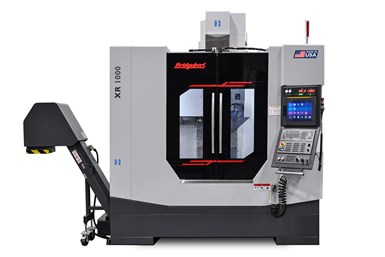Vertical Machining Center Designed for Flexibility
IMTS22: Hardinge’s Bridgeport XR1000 VMC is said to be ideal for machining everything from simple workpieces and quality molds/dies to complex prismatic parts.
Share




Hardinge is moving forward with its reshoring initiative, which will enable the company to furnish its customers with a complete line of advanced milling products supplied out of America. This initiative includes the U.S. launch of the Bridgeport XR1000 vertical milling center (VMC), which will be on display for the first time ever at IMTS.
The Bridgeport XR1000 VMC is said to be ideal for machining everything from simple workpieces and quality molds/dies to complex prismatic parts. It boasts the latest FANUC Plus control system with a high-resolution 15" touch screen and features the Intelligent Human Machine Interface (iHMI) which is designed to increase ease-of-use, improve operational efficiency and bring more control to the shop floor. Some of the standard features of the Bridgeport XR1000 include 12K Air Oil direct drive spindle, Big Plus CAT 40, 12,000-rpm spindle speed, CT40 or BT40 taper spindles, Big-Plus face taper spindle, a high-retention draw bar, rigid tapping and thermal compensation.
Benefits of the redesigned XR1000 include shorter lead times, improved user experience levels and a greater ability for full turnkey offerings for Hardinge’s customers.
Related Content
-
CNC Machine Shop Honored for Automation, Machine Monitoring
From cobots to machine monitoring, this Top Shop honoree shows that machining technology is about more than the machine tool.
-
Additive/Subtractive Hybrid CNC Machine Tools Continue to Make Gains (Includes Video)
The hybrid machine tool is an idea that continues to advance. Two important developments of recent years expand the possibilities for this platform.
-
6 Machine Shop Essentials to Stay Competitive
If you want to streamline production and be competitive in the industry, you will need far more than a standard three-axis CNC mill or two-axis CNC lathe and a few measuring tools.























.jpg;maxWidth=970;quality=90)